Larissa Lai was born in California, grew up in St. John’s, Newfoundland and Labrador, and has lived in Ottawa, Vancouver and Calgary. She graduated from the University of British Columbia with a B.A. (hon.) in sociology in 1990. In 2001 she completed an M.A. in creative writing from the University of East Anglia in Norwich, England. Her poems and short fiction have appeared in many literary journals. She is also an accomplished editor and curator. Lai completed a Ph.D. in English at the University of Calgary in 2006. Her dissertation is entitled: The “I” of the Storm: Practice, Subjectivity and Time Zones in Asian Canadian Writing. Lai was an assistant professor of Canadian literature at the University of British Columbia and later a Canada Research Chair in Creative Writing and an associate professor in the English Department of the University of Calgary. In 2020 she was awarded the Jim Duggins, PhD Outstanding Mid-Career Novelist Prize by the Lambda Literary organization. As of fall 2023, Lai will be a professor at the University of Toronto.
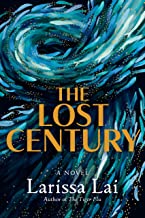
Fiction
The Lost Century
Vancouver: Arsenal Pulp Press, 2022.
PS8573.A3775 L67 2022
Publisher’s Synopsis (From its website)
On the eve of the return of the British Crown Colony of Hong Kong to China in 1997, young Ophelia asks her peculiar great-aunt Violet about the Japanese occupation of Hong Kong during World War II, the disappearance of her uncle Raymond, and whether her grandmother, Emily, was a murderer.
Emily’s marriage – three times – to her father’s mortal enemy causes a stir among three very different Hong Kong Chinese families, as well as among the young cricketers at the Hong Kong Cricket Club, who’ve just witnessed King Edward VIII’s abdication to marry Wallis Simpson. But the bickering around the scandal of Emily’s marriage is violently disrupted by the Japanese Imperial Army’s invasion of Hong Kong on Christmas Day, 1941, which plunges the colony into a landscape of violence none of its inhabitants escape from unscathed, least of all Emily. When her sister’s situation becomes dire, Violet, along with a crew of unlikely cosmopolitans, hatches a plan to rescue Emily from the wrath of the person she thought loved her the most – her husband, Tak-Wing. In the middle of it all, a strange match of timeless Test cricket unfolds in which the ball has an agency all its own.
With great heart, The Lost Century explores the intersections of Asian relations, queer Asian history, underground resistance, the violence of war, and the rise of modern China – a sprawling novel of betrayal, epic violence, and intimate passions.

Fiction
Salt Fish Girl
Toronto: Thomas Allen, 2002.
PS8573 .A373 S24 2002
Publisher’s Synopsis
Set alternately in nineteenth-century China and in a futuristic Pacific Northwest, Salt Fish Girl is the mesmerizing tale of an ageless female character who shifts shape and form through time and place.
Awards and Honours
2003 City of Calgary W.O. Mitchell Book Prize (Shortlisted)
2003 Sunburst Award for Canadian Literature of the Fantastic (Nominated)
2002 Alcuin Society Award for Excellence in Book Design in Canada–Prose Fiction (Honourable Mention); Designer: Gordon Robertson
2002 James Tiptree Jr. Award (Nominated)
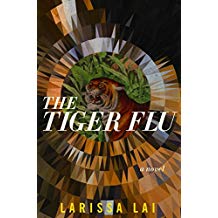
Fiction
The Tiger Flu
Vancouver: Arsenal Pulp Press, 2018.
PS8573 .A373 T54 2018
Publisher’s Synopsis (From its website)
In this visionary novel by Larissa Lai — her first in sixteen years — a community of parthenogenic women, sent into exile by patriarchal and corporate Salt Water City, go to war against disease, technology, and an economic system that threatens them with extinction.
Kirilow is a doctor apprentice whose lover, Peristrophe, is a “starfish,” a woman who can regenerate her own limbs and organs, which she uses to help her clone sisters whose organs are failing. When a denizen from Salt Water City suffering from a mysterious flu comes into their midst, Peristrophe becomes infected and dies, prompting Kirilow to travel to the city, where the flu is now a pandemic, to find a new starfish who will help save her sisters. There, Kirilow meets Kora, a girl-woman desperate to save her family from the epidemic. Kora has everything Kirilow is looking for, except the will to abandon her own family. But before Kirilow can convince her, both are kidnapped by a mysterious group of men to serve as test subjects for a new technology that can cure the mind of the body.
Bold, beautiful, and wildly imaginative, The Tiger Flu is at once a saga of two women heroes, a cyberpunk thriller, and a convention-breaking cautionary tale — a striking metaphor for our complicated times.
Awards and Honours
2019 Lambda Literary Award, Lesbian Fiction (Winner)

Fiction
When Fox is a Thousand
Vancouver: Press Gang Publishers, 1996.
Vancouver: Arsenal Pulp Press, 2004. (2nd ed.)
PS8573 .A373 W4 2004
Publisher’s Synopsis of the 2004 ed. (From its website)
When Fox Is a Thousand is a lyrical, magical story, a spirited retelling of the old Chinese folktale of the Fox. In Larissa Lai’s compelling first novel, a fox spirit comes to haunt the oddly named Artemis Wong, a young woman living in Vancouver. The fox brings with her the history of another haunting, that of the T’ang Dynasty poet Yu Hsuan-Chi, who was accused, perhaps wrongly, of having murdered the young maid servant who once worked for her.
One part history, one part fairytale, one part urban discontent, this delightful novel cracks open all preconceptions of Asian women, gender, sexuality, family, faith, and the flow of time. Smart, funny, and fully-imagined, When Fox Is a Thousand is beautiful, enchanting, and composed with a sure narrative hand. Lai’s potent imagination and considerable verbal skill result in a tale that continues to haunt long after the story is told.
First published to wide acclaim in 1995 (a finalist for the Chapters/Books in Canada First Novel Award) and out of print since 2001, this new edition of When Fox Is a Thousand, published by Arsenal Pulp Press for the first time, features a new afterword by the author.
Awards and Honours
1996 Amazon.ca/Books in Canada First Novel Award (formerly Chapters/Books in Canada; later renamed Amazon.ca First Novel Award co-presented with The Walrus) (Nominated)
Anthology (Short story)
“Rachel.” In So Long Been Dreaming: Postcolonial Science Fiction & Fantasy, ed. Nalo Hopkinson and Uppinder Mehan, 53-60. Vancouver: Arsenal Pulp Press, 2004.
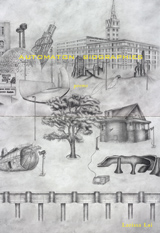
Poetry
Automaton Biographies
Vancouver: Arsenal Pulp Press, 2009.
PS8573 .A373 A87 2009
Publisher’s Synopsis (From its website)
The books consists of four long poems: “Rachel,” a meditation in the voice of the cyborg figure Rachel from Ridley Scott’s film Blade Runner and its source material, Philip K. Dick’s Do Androids Dream of Electric Sheep?; “nascent fashion,” which addresses contemporary war and its excesses; “Ham,” which circulates around the chimpanzee named Ham sent up into space as part of the Mercury Redstone missions by NASA in the 1960s and later donated to the Coulston Foundation for biomedical research; and “auto matter,” a kind of unfolding autobiography told in poems.
Awards and Honours
2010 Dorothy Livesay Poetry Prize (BC Book Prizes)(Nominated)
Poetry (Chapbook)
Eggs in the Basement
Vancouver, B.C.: Nomados, 2009.
PS8573 .A373 E44 2009
Awards and Honours
2010? bpNichol Chapbook Poetry Award (Shortlisted)
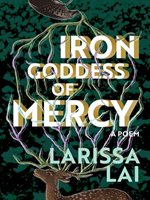
Poetry
Iron Goddess of Mercy
Vancouver: Arsenal Pulp Press, 2021.
PS8573.A373 I76 2021
Publisher’s Synopsis (From its website)
Iron Goddess of Mercy by Lambda Literary Award winner Larissa Lai (for the novel The Tiger Flu) is a long poem that captures the vengeful yet hopeful movement of the Furies mid-whirl and dance with them through the horror of the long now. Inspired by the tumultuous history of Hong Kong, from the Japanese and British occupations to the ongoing pro-democracy protests, the poem interrogates the complicated notion of identity, offering a prism through which the term ‘Asian’ can be understood to make sense of a complex set of relations. The self crystallizes in moments of solidity, only to dissolve and whirl away again. The poet is a windsock, catching all the affect that blows at her and ballooning to fullness, only to empty again when the wind changes direction. Iron Goddess of Mercy is a game of mah jong played deep into the night, an endless gamble.
Presented in sixty-four fragments to honour the sixty-four hexagrams of the I Ching, Iron Goddess of Mercy also borrows from haibun, a traditional Japanese form of travel writing in which each diary entry closes with a haiku. The poem dizzies, turns on itself. It rants, it curses, it writes love letters, but as the Iron Goddess is ever changing, so is the object of her address: a maenad, Kool-Aid, Chiang Kai-shek, the economy, a clown, freedom of speech, a brother, a bother, a typist, a monster, a machine, Iris Chang, Hannah Arendt, the Greek warrior Achilles, or a deer caught in the headlights.
Finally, a balm to the poem’s devastating passion and fury, Iron Goddess of Mercy is also a type of oolong tea, a most fragrant infusion said to have been a gift from the compassionate bodhisattva Guan Yin.
Summoning the ghosts of history and politics, Iron Goddess of Mercy explores the complexities of identity through the lens of rage and empowerment.
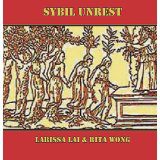
Poetry
Sybil Unrest
Co-author: Rita Wong.
Burnaby, B.C.: LINEbooks, 2008.
PS8595 .O5975 S92 2008
Synopsis (From Acknowledgements)
This poem began in a renga spirit during the 2003 Hong Kong International Literary Festival. … The conversational format and the intensive questioning produce an unstable, flickering sort of subjectivity that throws an enlightenment individual “i” into question, and hopefully explores its ideological underpinnings. It is into this unstable subjectivity that we attempt to reinject questions of gender, race and class, as well as geography, movement, power and hope.
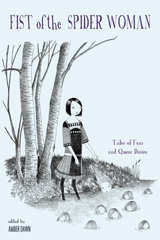
Anthology (Poem)
Fist of the Spider Woman: Tales of Fear & Queer Desire
Lai, Larissa. “Nascent fashion.” In Fist of the Spider Woman, edited by Amber Dawn. Vancouver: Arsenal Pulp Press, 2009, 98-102.
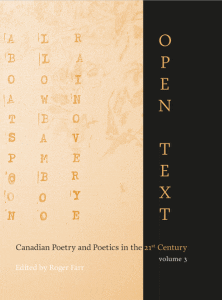
Anthology (Poem/Drama)
Lai, Larissa. “From Goodbye Butterfly, Hello Kitty: An Opiate Opera.” In Open Text: Canadian Poetry in the 21st Century. Volume 1, edited by Roger Farr. (North Vancouver, BC: CUE Books, 2008), 66-79.
PS8293.1 .O64 2008 v.1
Anthology (Prose)
Lai, Larissa, and Rita Wong. “Sybil Discontinuities, Earth Relations.” In Open Text: Canadian Poetry and Poetics in the 21st Century. Volume 3, edited by Roger Farr. (North Vancouver, BC: CUE Books, 2013), 30-38.
PS8293.1 .O64 2008 v.3
Anthology (Interview)
Producing Canadian Literature
Lai, Larissa. “Under Conditions of Restraint.” Interview by Kit Dobson and Smaro Kamboureli. In Producing Canadian Literature: Authors Speak on the Literary Marketplace. Waterloo: Wilfrid Laurier University Press, 2013, 150-167.
Selected Criticism and Interpretation
Allan, Kathryn. “Bleeding Chrome: Technology and the Vulnerable Body in Feminist Post-cyberpunk Science Fiction.” Ph.D. diss., McMaster University, 2010.
Available from Proquest Dissertations and Theses
Authers, Benjamin James. “‘Limited Imaginings’: Identity, Sexuality and Nation in Four Australian and Canadian Novels.” M.A. diss., Dalhousie University, 2002.
Available from Proquest Dissertations and Theses
Cheung, Ka Hing. “Creative Foundations: Rewriting in Larissa Lai’s Novels.” M.A. diss., University of Alberta, 2007.
Available from Proquest Dissertations and Theses
Cuder-Dominguez, Pilar. “The Politics of Gender and Genre in Asian Canadian Women’s Speculative Fiction: Hiromi Goto and Larissa Lai.” Chap. in Asian Canadian Writing Beyond Autoethnography, eds. Eleanor Ty and Christl Verduyn. Waterloo, Ont.: Wilfrid Laurier University Press, 2008, 115-132.
PS8089.5 .A8 A84 2008
Fox, Linda Christine. “Queer Outburst: A Literary and Social Analysis of the Vancouver Node (1995-1996) in English Canadian Queer Women’s Literature.” Ph.D. diss., University of Victoria, 2009.
Available from Proquest Dissertations and Theses
Fu, Bennett Yu-Hsiang. “Differing Bodies, Defying Subjects, Deferring Texts: Gender, Sexuality, and Transgression in Chinese Canadian Women’s Writing.” Ph.D. diss., Université de Montréal, 2004.
Available from Proquest Dissertations and Theses
Goellnicht, Donald C. “”Forays into Acts of Transformation”: Queering Chinese-Canadian Diasporic Fictions.” In Culture, Identity, Commodity: Diasporic Chinese Literatures in English, ed. by Tseen Khoo and Kam Louie. Montreal: McGill-Queen’s University Press, 2005, [153]-182.
PS153 .C45 C85 2005
Harry, Leanne Marie. “(Re)membering the Subject: The Politics of History, Memory, and Identity in Maria Campbell, Joy Kogawa, and Larissa Lai.” M.A. diss., Simon Fraser University, 2000.
Available from Proquest Dissertations and Theses
Hildebrand, Laura A. “”Speculated Communities”: The Contemporary Canadian Speculative Fictions of Margaret Atwood, Nalo Hopkinson, and Larissa Lai.” M.A. thesis, University of Ottawa, 2012.
Available as an open access thesis from The University of Ottawa.
Kim, Christine. “Troubling the Mosaic: Larissa Lai’s When Fox is a Thousand, Shani Mootoo’s Cereus Blooms at Night, and Representations of Social Differences.” Chap. in Asian Canadian Writing Beyond Autoethnography, eds. Eleanor Ty and Christl Verduyn. Waterloo, Ont.: Wilfrid Laurier University Press, 2008, 153-178.
PS8089.5 .A8 A84 2008
Latimer, Heather. “Fetal Cyborgs and Monstrous Clones: New Reproductive Technologies in Patchwork Girl and Salt Fish Girl.” Chap. in her Reproductive Acts: Sexual Politics in North American Fiction and Film. Montreal: McGill-Queen’s University Press, 2013, 104-133.
PS8191 .R47 L38 2013
Lee, Tara. “Promising Transnational Births: The Womb and Cyborg Poetics in Asian Canadian Literature.” Ph.D. diss., Simon Fraser University, 2006.
Available from Proquest Dissertations and Theses
Luo, Shao-Pin. “Translation and Transformation in Chorus of Mushrooms and When Fox is a Thousand.” In Asian Women: Interconnections, eds. Tineke Hellwig and Sunera Thobani. Toronto: Women’s Press, 2006, 115-138.
HQ1726.A834 2006
Malek, Elska Ray. “Running Away with the Concubine: Lesbianism and Larissa Lai’s “When Fox is a Thousand”.” M.A. diss., University of Guelph, 2001.
Available from Proquest Dissertations and Theses
Morris, Robyn. “Looking Through the Twin Lens of Race and Gender: A New Politics of Surveillance in Asian Australian and Asian Canadian Women’s Writing.” Ph.D. diss., University of Wollongong, 2008.
Available as an open access dissertation from The University of Wollongong.
Narduzzi, Dilia. “(Un)natural Bodies: Reproduction, Disability, Queerness.” Ph.D. diss., McMaster University, 2011.
Available from Proquest Dissertations and Theses
Prater, Tzarina, and Catherine Fung. “”How Does it not Know What it is?”: The Techno-Orientalized Body in Ridley Scott’s Blade Runner and Larissa Lai’s Automaton Biographies.” In Techno-Orientalism: Imagining Asia in Speculative Fiction, History, and Media, eds. David S. Roh, Betsy Huang and Greta A. Niu. New Brunswick, NJ: Rutgers University Press, 2015, 193-208.
PN3433.6 .T43 2015
Sturgess, Charlotte. “Questions of Voice, Race, and the Body in Hiromi Goto’s Chorus of Mushrooms and Larissa Lai’s When Fox is a Thousand.” Chap. in Crosstalk: Canadian and Global Imaginaries in Dialogue, eds. Diana Brydon and Marta Dvorák. Waterloo: Wilfrid Laurier University Press, 2012, 185-195.
PS8057.1 .C76 2012
Turner, Cameron J. “Binding the Monstrous Animal in H. G. Wells’s “The Island of Dr. Moreau” and Larissa Lai’s “Salt Fish Girl”.” M.A. diss., University of Nevada, Reno, 2009.
Available from Proquest Dissertations and Theses
Ty, Eleanor. “Shape-shifters and Disciplined Bodies: Feminist Tactics, Science Fiction, and Fantasy.” Chap. in Unfastened: Globality and Asian North American Narratives. Minneapolis: University of Minnesota Press, 2010, 89-107.
PS153 .A84 T9 2010 (also available as an e-book)
Links
Larissa Lai personal website (includes comprehensive bibliographical information)
Larissa Lai and Rita Wong in conversation with by Fazeela Jiwa in LemonHound (June 9, 2014)
Publisher Arsenal Pulp Press
Larissa Lai profile page at the University of Calgary, Dept. of English